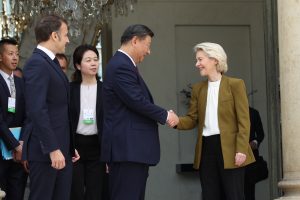On May 13, China Central Television, a state media outlet, published a documentary of President Xi Jinping and his state visits to three European countries last week. The 26-minute-long propaganda film captured select moments of Xi’s trips to France, Serbia, and Hungary, featuring meetings with the three countries’ top leaders, as well as Ursula von der Leyen, president of the European Commission.
Surrounded by enthusiastic people waving Chinese flags, chanting and cheering for his presence, Xi appeared to be confident, enjoying his moment.
With numerous published articles, short videos, and documentaries, the Chinese propaganda apparatus has been working diligently to take some victory laps after Xi’s visit to Europe. On the sideline of the trip, Chinese companies secured deals with French enterprises on energy, finance, and transport. China upgraded its relations with Serbia and the two will implement a new trade agreement. In Budapest, China firmed a number of agreements on economic development with Hungary and sealed an “all-weather comprehensive strategic partnership.” Beijing intends to leverage the EU member state’s position to advance Chinese interests in Europe.
While the trip concluded with happy faces and gift exchanges, it is obvious that concrete substances and outcomes were missing in key areas of interest to Beijing. For China and Xi Jinping, the trip to Europe was primarily aimed at seeking relief from increasing diplomatic pressure from the United States. On that front, China has accomplished very little from these high-profile state visits. While Beijing was able to tout breakthroughs with Serbia and Hungary, China has seen very few positive signs in its recent diplomatic engagements with the EU, and key EU members such as France and Germany.
Still prioritizing its “no-limits” relationship with Russia, China continued to disappoint European politicians who hoped to see changes on the diplomatic front to put an end to the war in Ukraine. Instead, Xi remained equivocal on the Russia-Ukraine War and is unwilling to use China’s influence to stop the Russian invasion of Ukraine. Xi’s decision to host Putin for a state visit less than a week after departing Europe only rubbed salt in the wound.
On the issue of fair economic competition, China took a rather passive-aggressive approach to concerns raised by the EU, offering little in the way of compromise.
These headwinds are coming at a difficult time for China, which is facing internal economic difficulties and looking, as always, to robust international trade to right the ship. Diplomatic struggles with the United States have indirectly led to the decline in economic development in China, and the problems look set to get worse before they get better.
To curb China’ support for Russian war efforts, the United States is considering imposing sanctions on Chinese financial institutions. On May 14, U.S. President Joe Biden also announced high tariffs against Chinese electric vehicles, batteries, and other goods. The EU is pursuing its own trade investigations into these sectors, which could lead to tariffs in the future. At the same time, surveys show that European businesses are moving their investments out of China over the country’s diminishing returns and increasing risks on the political front.
While human rights issues did not become the center of the discussions during Xi Jinping’s visit to France, clandestine Chinese state actions in democratic countries still made it into the headlines after French media reported that disguised Chinese agents attempted to force a dissident in France to board a plane to China. The reports highlighted a trend of China’s foreign meddling and transnational oppression not only in France but in numerous democratic nations, further marring China’s international image.
In the past five years, China has found itself in various degrees of diplomatic conflicts with major democratic nations globally. In addition to the lack of progress with the EU and the United States, China has seen relations with the United Kingdom sour over its handling of Hong Kong and allegations of espionage and influence operations. China is also accused of meddling in the last two Canadian federal elections. As for its neighboring countries in East Asia, China routinely provokes its domestic nationalistic sentiments against Japan and South Korea and makes military threats against Taiwan.
China will see little diplomatic progress with democratic countries in Europe and beyond without making substantial changes.
































